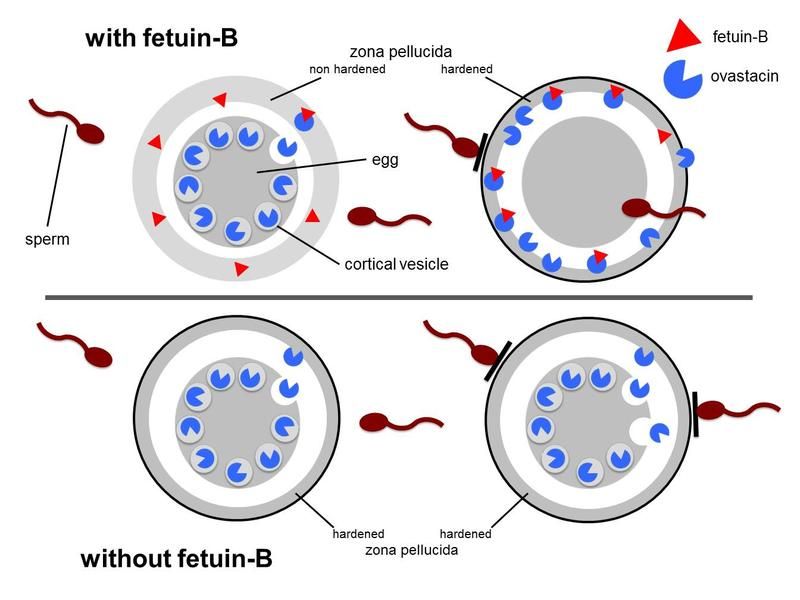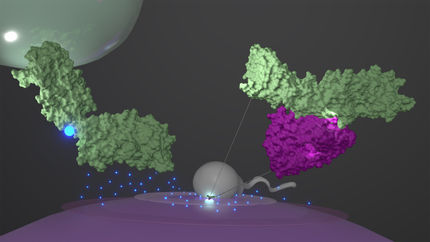Important fertility mechanism discovered
Plasma protein fetuin-B regulates hardening of the zona pellucida and thus ensures the fertilization capacity of the ovum
Scientists in Mainz and Aachen have discovered a new mechanism that controls egg cell fertility and that might have future therapeutic potential. It was revealed by Professor Dr. Walter Stöcker of the Institute of Zoology at Johannes Gutenberg University Mainz (JGU) that the blood protein fetuin-B plays an important and previously unknown role in the fertilization of oocytes. Fetuin-B, first identified in the year 2000, is formed in the liver and secreted into the blood stream. During a joint research project with researchers at RWTH Aachen University headed by Professor Dr. Willi Jahnen-Dechent of the Helmholtz Institute for Biomedical Engineering, it was discovered that fetuin-B contributes to egg cell fertility by regulating the hardening of the protective zona pellucida of oocytes.

Oocyte fertilization with and without fetuin-B
Walter Stöcker
The scientists at Aachen discovered that female mice lacking fetuin-B were infertile even though their ovaries developed normally. But fertility was restored when their ovaries were transplanted in wild-type mice with normal fetuin-B production. "This demonstrates that it was not the ovaries themselves but the plasma protein fetuin-B that determined whether the mice were fertile or not," explained Stöcker.
The role played by the plasma protein fetuin-B was decoded in cooperation with the team in Aachen. The mechanism appears to operate as follows: The oocytes of humans and other mammals are surrounded by a protective envelope called the zona pellucida. This envelope hardens immediately after the successful fertilization of the egg cell by a sperm, which means that subsequent sperm are unable to penetrate the ovum, thus preventing multiple fertilization (polyspermy). Polyspermy results in the death of the embryo in many mammals. The hardening of the zona pellucida is triggered by the proteolytic enzyme ovastacin, the function of which Stöcker's team in Mainz has been investigating. The protease ovastacin is stored in vesicles within the egg cell and when the first sperm penetrates the ovum, the protease is explosively discharged into the gap between the egg cell and the zona pellucida in what is known as the cortical reaction.
However, small amounts of ovastacin continually seep from unfertilized egg cells and this would cause the zona to harden before the first sperm can penetrate. "It is the role of fetuin-B to ensure that these constantly escaping small quantities of ovastacin are inactivated so that oocytes can be fertilized," Stöcker added. "However, once a sperm has penetrated an egg cell, the cortical reaction will be unleashed and the amount of ovastacin will overwhelm the inhibition capacity of fetuin-B and initiate the hardening process."
This is the first time that it has been shown that premature hardening of the zona pellucida can be a cause of infertility. It is thus possible that this could represent the basis for the development of future forms of infertility treatment.
Original publication
Most read news
Other news from the department science

Get the life science industry in your inbox
By submitting this form you agree that LUMITOS AG will send you the newsletter(s) selected above by email. Your data will not be passed on to third parties. Your data will be stored and processed in accordance with our data protection regulations. LUMITOS may contact you by email for the purpose of advertising or market and opinion surveys. You can revoke your consent at any time without giving reasons to LUMITOS AG, Ernst-Augustin-Str. 2, 12489 Berlin, Germany or by e-mail at revoke@lumitos.com with effect for the future. In addition, each email contains a link to unsubscribe from the corresponding newsletter.






















































